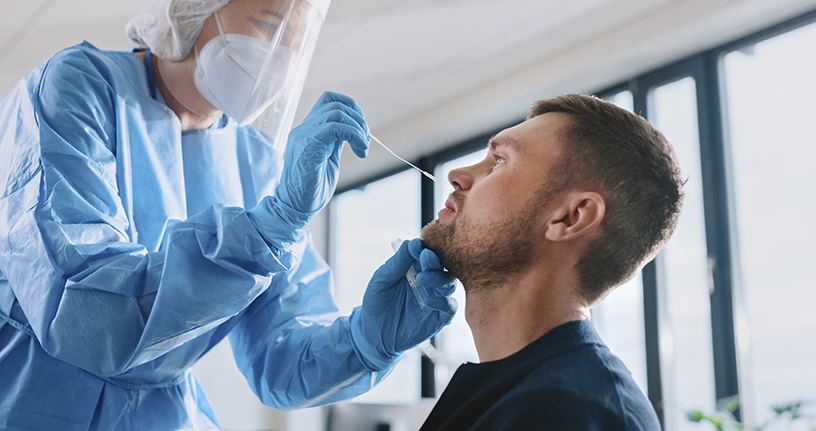Covid 19, caused by severe acute respiratory syndrome Coronavirus 2 (SARS-CoV-2), is commonly diagnosed by Covid 19 RT-PCR test to detect viral RNA in patient samples. According to medical professionals, the PCR test is an accurate and reliable way to diagnose the severe respiratory syndrome.
An unprecedented upsurge of Covid 19 cases and deaths are witnessed worldwide. Testing, tracking, isolation, and home-based treatment of positive patients is the key to controlling the transmission of SARS-CoV-2, the virus responsible for causing Covid 19.
What is the RT-PCR Test?
The Covid -19 RT-PCR test is a real-time reverse transcriptase-polymerase chain reaction test to detect nucleic acid from SARS-CoV-2. Scientists use this technology to look for Ribonucleic acid or RNA of the virus. The test is prescribed to identify or detect the presence of coronavirus in your respiratory system whether you are infected with the virus at the time of the test. A fluid sample is taken by inserting a long nasal swab (nasopharyngeal swab) into your nose and extracting fluid from the back of your nose. In some cases, a swab is inserted into your throat (oropharyngeal swab) to produce a sample. Results may be available after a few days. The test could also detect fragments of the virus even after you are covid free. Covid 19 PCR testing is largely considered a reliable way for diagnosing Covid-19.
Why PCR Test?
Your health care experts may recommend a Covid-19 diagnostic test if any of the following applies to you:
- You have Covid-19 symptoms such as cough, fever/chills, fatigue, shortness of breath, headache, body ache, or shortness of breath. Furthermore, symptoms may vary; therefore, it is important to visit a doctor if you suspect the presence of severe accurate respiratory syndrome.
- You don’t have symptoms, but you have had close contact with someone who tested positive for the Covid-19 virus or is suspected of contracting the novel coronavirus. Here, close contact means you have been within two meters of the infected person. But if you got positive results within the past three months, you don’t need to get tested. If you have been fully vaccinated and have had close contact with a Covid-positive person, get the test done 2 to 5 days after contact with them.
- You have indulged in activities that increase your risk of contracting the virus and did not stay at least two metres away from others. You might have travelled, visited a crowded place, or attended a gathering.
Certain categories must be prioritized for Covid 19 PCR testing depending on the guidelines recommended for monitoring covid-19 in individual communities. Some people with Sars-CoV-2 may be asymptomatic, meaning they don’t show symptoms. But they are still able to transmit the virus to others. There are some places in the US where testing is available for asymptomatic people. If people without symptoms are found positive for Covid-19, they should follow guidelines for self-isolation to control the spread of the virus.
The availability of RT-PCR tests and where to get tested may vary depending on where you live and the recommendations of your local health care expert.
What are the Risks?
There are chances that your Covid-19 RT-PCR test could return a false-negative result even though you have 2 or more symptoms of Covid infection. This means the virus can’t be detected with the diagnostic test, even though you are infected with it. This way, you unknowingly can spread the virus to others. Therefore, it is important to take precautions, such as following social distancing norms, wearing masks when stepping outside, and washing hands frequently.
How do you Protect?
Whether or not you have symptoms, be sure to wear a face mask whenever you visit a health care centre for a diagnostic test. If you suspect you have Covid-19, call your doctor to review your symptoms and ask about testing before you enter inside. This way, medical staff can prepare for your visit, wearing personal protective equipment. If you have no symptoms but come in contact with someone who tested corona positive, follow the testing advice of your health care professional. Having a Covid-19 test done 5 to 7 days after coming in contact with the infected person is best. If you are tested too soon, there are chances the test may not detect the presence of the virus.
Conclusion
No test provides 100% accuracy; tests need to be evaluated to determine sensitivity and specificity. Covid 19 RT-PCR test looks for the genetic material of the virus itself in the nose and throat to determine if it is an active infection caused by SARS-CoC-2.




